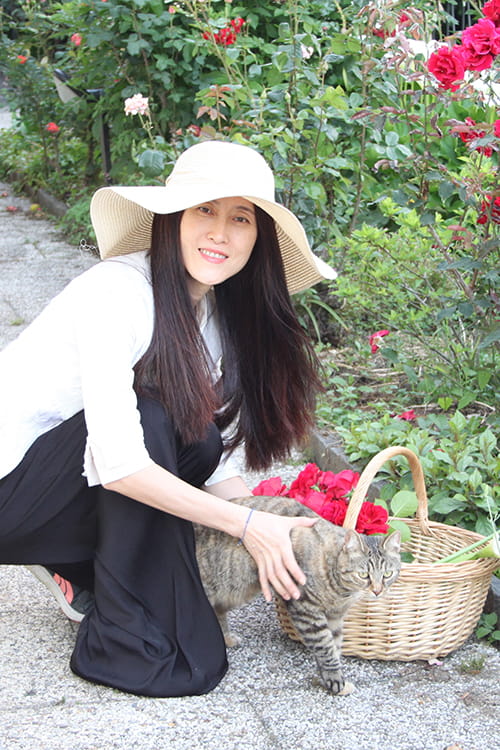Jian Shi Cortesi describes running GAM Investments’ China and Asia funds as her “dream job”. She discusses her varied career, spanning three continents, China’s rapid growth and what drives her as an investment manager.
22 June 2023
Since she was very young, Jian had always wanted to manage money. Trips to the bank with her father not only taught her the importance of managing money but were also a way to connect with him. While it was clear to her what she wanted to do, she was the first in her family to pursue a career in finance and she did not initially know how to get there. After achieving a bachelor’s degree in International Business, she moved to Beijing to work for Dow Jones where she gained further exposure to the financial market, eventually leading her to the US to study for an MBA. While there she began working as an equity analyst and then investment strategist on Asian equity. Her move to Switzerland came in 2009 with her husband where she landed her dream job with GAM; Jian credits her work at GAM as some of her greatest achievements. Within three or four years of her working there, GAM launched a China equity fund to be managed by Jian. “I was involved from day one and I was able to run the strategy with the approach that I believe in.” She describes the challenge of proving herself, not just through performance but by growing the AUM of the fund. Investors were hesitant of an investment manager who sat in Switzerland to invest in Chinese equities, however after three to five years of consistent performance those fears were allayed.
As a longer-term orientated investor, Jian believes there might be an advantage in being based in Switzerland while investing in Asian and China equities. “Investing is an intellectual process. I don’t need to sit in Seattle to figure out how much Starbucks is worth.” While it is key to understand the market, and her background means she understands the culture, the business dynamic and industry trends, working from Switzerland means she is away from all the day-to-day noise. “When you are in Hong Kong or Shanghai, everybody’s talking about the same names and it is difficult to focus on non-consensus names, but that is where you have to invest to outperform. Blocking out the noise is definitely an advantage.” She is also in constant conversation with companies in China and Asia and regularly travels to the region on field trips.

Jian believes that living in a number of cities across the world has given her a global view. For example, she sees a gap in terms of perception from people in China or in the US based on their own experience, what they are used to, their own ideologies. She also believes it helps her better understand the financial market. Furthermore, when it comes to investing in China, many industries that have emerged in the last 20 years were new to China but had already reached the US and Europe. As a result, having watched the emergence of these industries play out in the US and Europe, Jian found it a useful blueprint to see how they might evolve in China. However, a particular industry might develop one way in the US or Europe and take a different form in China against a different cultural background. These similarities and differences are, she says, what makes her job interesting.
For Jian, one of the most striking differences between Switzerland and China is the rapid change taking place in the latter. She believes that if you left Switzerland for 10 years and returned, it would still feel quite familiar. Meanwhile, she can, for example, map Beijing’s rapid change by the circular ring roads which have steadily expanded outwards to keep pace with the rapid population growth. When she left Beijing in 2000, when it had a population of around 10 million people, the city was just beginning to expand outside the third ring. Now, there is a sixth ring. “There has been a lot of rapid change on a big scale”, she recounts. She also recalls data that estimated that those born in China in the 1980s have since seen the average income rise by 30 times. She counts herself as a member of the lucky generation that has experienced this change, remembering a time when people had little furniture and telephones were scarce. “Nobody foresaw that one day we would have cars, yet today all my friends have cars.” Jian believes that besides the obvious benefits this rapid growth in prosperity has brought, it has created more optimism and confidence about what to look forward to in the future compared to the West.
While China and Asia have been considered fast-developing regions over the past 20 years, they are still relatively small compared to developed economies. In the coming 10 to 20 years, Jian believes that although growth may slow relatively, it will still continue on a very large scale. “We have seen a rapid catch up, especially in Northern Asia, in terms of technology development. They are really at the forefront and China is now competing directly with the US in many technologies.” She refers to a recent research paper indicating that China and the US are already neck to neck in that competition. “More competition and rivalry creates more investment opportunities, but hopefully not hostility.”
Going forward, given the sheer size of the Chinese population and the income growth seen in China, two of the key sectors Jian is focusing on are consumption and technology. In China, GDP per capita is around USD 13,000 – USD 14,000. Last year at the 20th Party Congress, the government indicated its objective to grow GDP per capita to a level on par with a mid-level developed country by 2035. If we consider Spain or Portugal as a mid-level developed country, the implication would be for China’s GDP per capita to double. When you have such a substantial GDP per capita times the 1.4 billion people, that equates to a huge consumption power. China is already the largest market in many sectors; for example it has been the largest car market for a number of years. It is also the largest digital economy, with burgeoning e-commerce and online entertainment sectors. For income to grow, the consumption upgrade is key; the population are eating better, consuming more discretionary items, travelling more, and spending more money on cosmetics and healthcare. And there are many associated areas that will grow alongside income growth; for example, there is more need for wealth management, private banking and insurance.
One of the major events in recent years has been the pandemic. One of the big changes was from office working to flexible working. “There are a lot of advantages of working from home,” says Jian. She believes it is a good thing in terms of the time saved commuting. However, she does miss her commute, which was two hours each way. It gave her a big block of time to think, which many, constantly running around, find difficult to replicate. “When you have a lot of information and not a lot of time, it is like you are constantly eating but you do not have time to digest.”
The pandemic demonstrated to Jian just how adaptive people can be. For example, once China lifted its zero-Covid policy, within two months the majority of people were infected. By March this year, however, Covid was rarely mentioned as people began moving on with their lives.
Jian’s goal is simple: be the best in her field. Even after winning awards, the competition does not cease. To be best in class every year is a continuous challenge, as markets, styles and sectors are constantly changing. “You never get bored. I still have so much to learn as it is so dynamic. My husband likes to do exciting things like skydiving but I avoid such things. People say don’t you want some excitement? I say I have plenty in my work.”

“As a portfolio manager, I would not say that I am smarter than other people, or even that I work harder than other managers but one thing which has really helped me is a strong desire to do well in my job that I had wanted so badly. When I started working in Switzerland, with my two-hour commute to Zurich, it could be exhausting at times. I would ask myself why I was doing this; maybe I should just stay at home and do yoga. So many times I would think this and then the next morning I would get up at five because I knew this is what I want to do and I couldn’t stop it. I have such a strong desire to do this job and to do it well. I think when you have this desire, you are motivated to figure out whatever challenge you are faced with. I hope that fire will keep burning.”
To relax, Jian enjoys dancing, taking flamenco lessons and starting country line dancing, which she says is a very simple form of dance that does not require a lot of talent. She enjoys the movement and the music. She also enjoys gardening. “I think the frustrating thing about this job can be that you can work very hard and not necessarily see results immediately; there is a lot of delayed gratification.” However, gardening offers a relief from that. “You plant flowers and every day, every week you see some difference and you can see the results so it gives you satisfaction.”
The information contained herein is given for information purposes only and does not qualify as investment advice. Opinions and assessments contained herein may change and reflect the point of view of GAM in the current economic environment. No liability shall be accepted for the accuracy and completeness of the information contained herein. Past performance is no indicator of current or future trends. The mentioned financial instruments are provided for illustrative purposes only and shall not be considered as a direct offering, investment recommendation or investment advice or an invitation to invest in any GAM product or strategy. Reference to a security is not a recommendation to buy or sell that security. The securities reflected herein were selected from the universe of securities covered by the portfolio managers to assist the reader in better understanding the themes presented. The securities included are not necessarily held by any portfolio or represent any recommendations by the portfolio managers.
This article contains forward-looking statements, which are statements, without limitation, relating to market performance that include words like "believe", "estimate", "may", "can", "will", "should", "expect", "potential", the negative of these words or such other variations thereon. Such forward-looking statements are not historical facts. Rather, these forward-looking statements are based on the current beliefs, assumptions, expectations, estimates, and projections of the author about the markets and the economy. These forward-looking statements are not guarantees of future performance and are subject to risks, uncertainties and other factors, and are difficult to predict. Consequently, the economy and the markets could perform materially different from what is expressed, implied or forecasted in these forward-looking statements. Undue reliance should not be placed on these forward looking statements. Neither the author nor GAM intend, or undertake any obligation, to update any forward-looking statements to reflect events or circumstances after the date of this article or the date on which any subsequent forward-looking statement is made to reflect the occurrence of unanticipated events.
